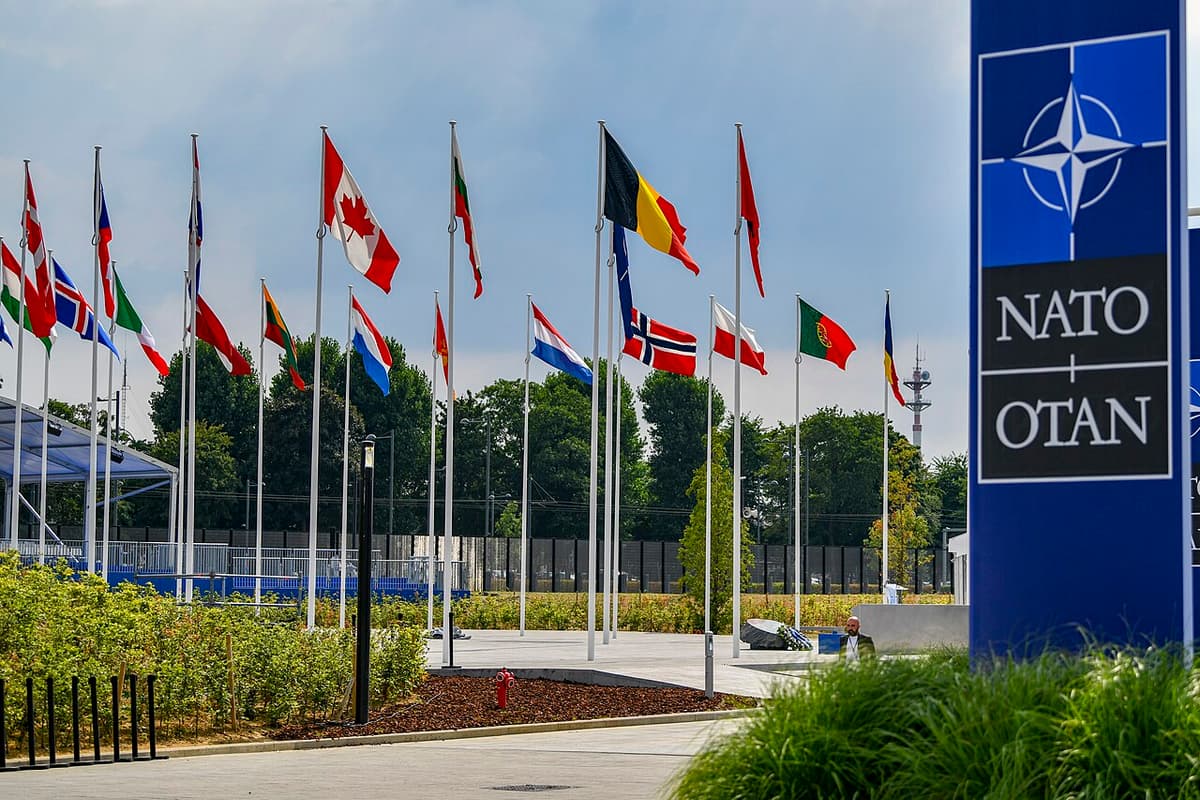Biden Expected To Show for Glad-Handing as NATO Marks Its 75th Birthday Next Week at Washington
President Zelensky, though Ukraine is yet to become a member, will be there looking for weapons.

President Biden will be glad-handing and back-slapping next week in the kind of setting he likes best — a gathering of world leaders at which superficial displays of friendship and diplomacy should trump nasty politics.
The occasion will be the 75th anniversary of the founding of the North Atlantic Treaty Organization, a conglomeration of 32 countries. Their leaders are converging on Washington next week to see how or if they can agree on the defense of Western Europe against Russia.
The war in Ukraine is sure to be the top topic. President Zelensky will be pleading publicly and privately for the support he desperately needs as the Russians grind down his depleted forces. While begging for aid, he’s hoping to avoid the vitriol of last year’s NATO summit at the Lithuanian capital of Vilnius, where members argued over admitting Ukraine into NATO, a move sure to inspire Russia to new levels of rage.
For NATO and Ukraine, the Washington summit may be the last chance they get for smooth sailing. NATO has been the target of criticism from President Trump, during his term in the White House and now in his campaign, as he takes NATO members to task for not contributing their agreed share of mutual defense.
President Trump has also said that he would reach a peace deal with Mr. Putin quickly if or when the 45th president takes office again. The prospect of Trump lending an unsympathetic ear to Ukraine’s perceived needs undoubtedly plays into Mr. Zelensky’s approach toward next week’s NATO summit.
“Ukrainian leadership has been much more pragmatic this time around in terms of trying to shape an agenda that really focuses on capabilities rather than on an invitation,” says a senior fellow at the Carnegie Endowment, Eric Ciaramella. “I haven’t seen the same kind of expectation-setting that we saw in advance of the Vilnius summit happening this time.”
A former analyst with the National Intelligence Council and the CIA, Mr. Ciaramella gets the impression from European and American officials that they’re hoping for a much easier time at next week’s summit than at Vilnius, where the final statement was ironed out only at the last minute.
“The constant refrain I’ve heard ahead of Washington is ‘no repeat of Vilnius,’” he said in an interview put out by Carnegie. “What they mean is the acrimony displayed between Ukrainian leadership and NATO member-state leadership over the issue of membership invitation — which obviously Ukraine wanted, and still wants, and pursued up until the last minute of the Vilnius summit.”
While Mr. Zelensky lobbies for more and better weapons, Mr. Biden is sure to engage in happy talk praising NATO for having endured for 75 years from its birth as a 12-nation alliance to 32 members. NATO is still going strong, though its Cold War nemesis, the Warsaw Pact, has been dissolved for more than 30 years.
Mr. Biden set the tone in an artfully crafted statement, posted by the State Department, noting that the allies would be “joined by Ukraine for a meeting of the NATO-Ukraine Council,” set up at last year’s Vilnius summit to coordinate support for Ukraine. Such “close collaboration,” Mr. Biden said, would “build a bridge to Ukraine’s future membership” — a super-polite way of saying, not this year, Mr. Zelensky.
Portentously for the future of NATO and the entire American-managed alliance system, the leaders of Japan, South Korea, Australia, and New Zealand will also be at the summit as observers. On the sidelines, they are sure to be conferring with Mr. Zelensky on how to provide aid for Ukraine without getting too involved militarily — and also talking to NATO leaders about collaboration on defense in the Indo-Pacific.
South Korea’s president, Yoon Seok-yul, in particular faces the difficult issue of providing military aid indirectly to Ukraine while North Korea’s Kim Jong-un pumps artillery shells into Russia and tests new models of missiles that could be used for war against the South. Mr. Yoon has approved selling shells to Washington, which then ships American-made shells to Ukraine.
Backstage, diplomats are working on how to smooth out the rough edges of disagreement. “Alliance leaders will highlight NATO’s rejuvenated unity” and “will deliver its updated concept for defense and deterrence,” writes a senior fellow at the Atlantic Council, Ian Brzezinski, “but will the summit confirm that NATO can still draw upon the political will—the political grit—necessary to defeat its adversaries?”

